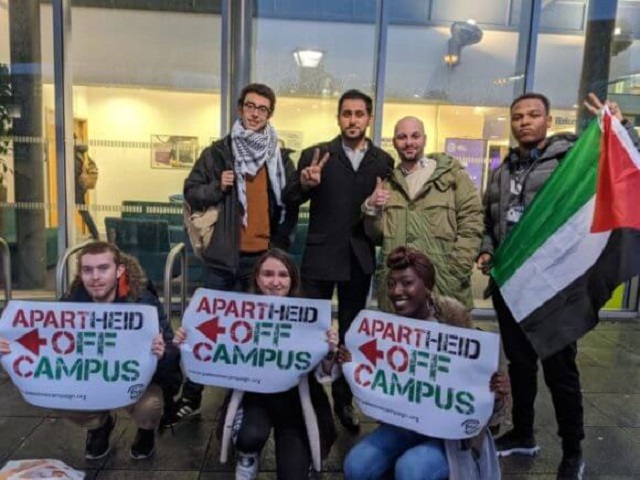Why are ‘ethical’ UK universities investing in Israel’s apartheid? Comment
New in Ceasefire, Politics - Posted on Monday, December 7, 2020 9:00 - 1 Comment
By Taj Ali

Leeds Beckett University students take part in a national day of action against Israeli apartheid in 2019 (Credit: Palestine Solidarity Campaign/Mondoweiss)
Last Sunday marked the international Day of Solidarity with the Palestinian people and many have renewed calls for the rest of the world to continue to stand in solidarity with the Palestinian people. Many British students have called on their universities to end their complicity in the oppression of the Palestinian people but are universities listening?
Many British universities in the UK claim to follow an ethical investment policy. For instance, the University of Warwick, my former university, claims to follow an investment policy that seeks to “reduce, and, ideally, eliminate, corporate behaviour” that leads to “armament sales to military regimes” and “human rights violations” and yet the university still invests over one million pounds in companies complicit in Israeli human rights abuses.
Despite claims to the contrary, British university investments are anything but ethical. According to research from the Palestine Solidarity Campaign, universities invest an estimated £450 million in companies with links to Israeli human rights abuses
One such company many British Universities have partnered with is BAE systems whose weapons were used by the Israeli government during the 2014 massacre on Gaza and continue to be used to maintain the siege on Gaza which has contributed to a humanitarian crisis and exacerbated difficulties during the coronavirus pandemic.
Another company many universities have partnered with is JCB which provides the Israeli government with bulldozers that they use to demolish Palestinian homes. Just a few weeks ago, the entire village of Khirbet Humsah in the West Bank was demolished, leaving over 70 Palestinians homeless.
By investing in and partnering with companies like these, universities are strengthening and legitimizing the illegal Israeli occupation and directly furthering the oppression and killing of Palestinians. Many students have demanded that their tuition fees are not invested in companies complicit in Israeli atrocities and yet they have been largely ignored by their own institutions.
The student movement has a rich and proud tradition of anti-apartheid activism. It was the student movement which lobbied their universities to end their complicity with apartheid South Africa. British students played a key role in forcing Barclays Bank to end its investments in South African Apartheid by passing divestment motions on their campuses in the 1970s and 1980s
In 2005, more than more than 250 Palestinian civil society organisations endorsed the tactic of Boycott, Divestment and Sanctions (BDS) which was used to end apartheid in South Africa. Today, human rights activists organise BDS campaigns to target the Israeli state because of its responsibility for serious violations of international law and the companies that participate in and are complicit in these violations.
Just a fortnight ago, Secretary of State Mike Pompeo announced plans to recognize the BDS movement as antisemitic. Pompeo also said that the US would withdraw funding from groups which boycott Israel, referring to the BDS movement as a “cancer”. Such a move could stop vital funds going to Palestinian human rights organizations and only emphasises the hostility that BDS campaigners face internationally.
Such a tactic was used to derail the movement to end apartheid in South Africa, with many apologists for apartheid accusing campaigners accusing BDS campaigners of singling out the South African regime because they were “anti-Boer”.
This is the latest move in a series of sustained attempts to shield Israel from accountability over its human rights violations. The BDS movement does not campaign against any individual simply because they are Israeli but rather it is a tried and tested non-violent tactic that has been used to pressure companies to end their complicity in the oppression of marginalised people.
Despite attempts to legitimize the BDS movement, many students have heeded the calls from Palestinian civil society and pressured their institutions to cut ties with companies complicit in human rights abuses against Palestinians. Boycott, Divestment and Sanctions (BDS) motions have been passed at various University Students’ Unions across the UK such as Manchester, Leeds and King’s College London. This year, the Apartheid Off Campus (AOC) network was launched by student activists across the UK, to coordinate a national campaign to further pressure universities to end their investments in companies complicit in Israeli apartheid.
Students have spearheaded much of the work to highlight their own institutions’ complicity in injustices; it’s time for universities to listen. It is imperative that universities abide by their own ethical investment policies and remove all links with companies and institutions complicit in human rights abuses.



The text is excellent. I hadn’t read anything both meaningful and objective in a long time. For newbies, this is a terrific script. I’ll tell my friends about it if they don’t know where to go.